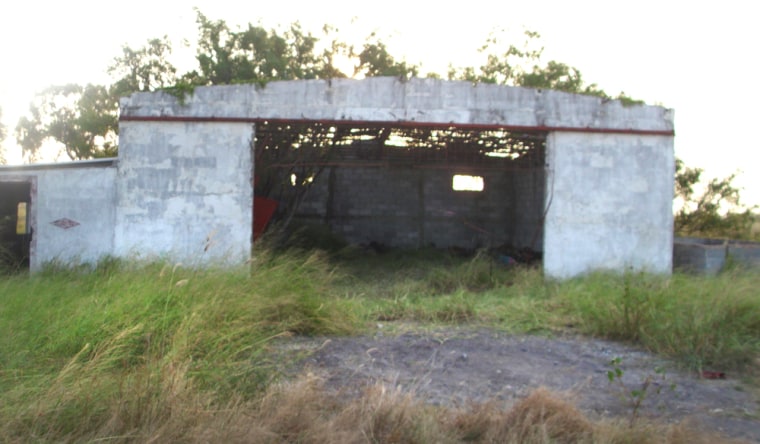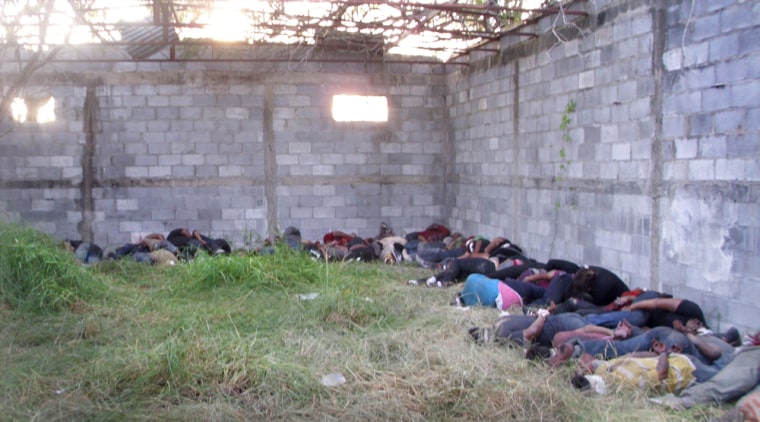The sole survivor in the massacre of 72 illegal immigrants headed to the U.S. has said a notorious drug gang gunned them all down after they refused to work as assassins, according to a source at the prosecutor's office for the state of Tamaulipas quoted in Mexican media.
The teen — an Ecuadorian who escaped and stumbled wounded to a military checkpoint on a highway — told authorities that his captors had identified themselves as Zetas, a drug gang whose control of parts of the northern state of Tamaulipas is so brutal and complete that even many Mexicans avoid traveling its highways.
The 19-year-old staggered to the checkpoint with a bullet wound in his neck and face, saying he had played dead to escape from Zetas gunmen at a ranch in San Fernando, just 100 miles south of Brownsville, Texas.
He told investigators that Zetas gunmen intercepted the migrants as they moved toward the border, then took them blindfolded to the ranch where they were told to hand over cash, the source said.
The migrants had little cash, the teen reportedly said, and the gunmen then told them they could work as Zetas assassins and get paid $2,000 a month. It was not clear if they were supposed to work in the United States.
When the migrants refused, the gunmen opened fire, the source described the teen as saying.
While the teen's name had been reported earlier, msnbc.com has decided to remove it given concerns he could be targeted.
President Felipe Calderon vowed to investigate how his name was leaked, saying he "personally gave the order to shield the witness' identity."
Details of what the teen told investigators were reported widely in Mexico, including the Reforma and El Universal newspapers in Mexico City.
The Zetas gang, started by former Mexican army special forces soldiers, is known to extort money from migrants who pass through its territory.
Violence along the northeastern border with the U.S. has soared this year since the Zetas broke with their former employer, the Gulf cartel. Authorities say the Gulf cartel has joined forces with its once-bitter enemies, the Sinaloa and La Familia gangs, to destroy the Zetas, who have grown so powerful they now have reach into Central America.
It was the third time this year that Mexican authorities have discovered large masses of corpses. In the other two cases, investigators believe the bodies were dumped at the sites over a long time.

Zetas spies in shelters
The Rev. Alejandro Solalinde, who runs a shelter in the southern state of Oaxaca, where many migrants pass on their way to Tamaulipas, said the Zetas have put informants inside shelters to find out which migrants have relatives in the U.S. — the most lucrative targets for kidnap-extortion schemes.
He said he constantly hears horror stories, including people who "say their companions have been killed with baseball bats in front of the others."
Solalinde said he has been threatened by Zetas demanding access to his shelters.
He said the gangsters told him: "If we kill you, they'll close the shelter and we'll have to look all over for the migrants."
If confirmed as a cartel kidnapping, the Tamaulipas massacre would perhaps be the most extreme case seen so far and the bloodiest massacre of Mexico's drug war.
Calderon said cartels are increasingly trying to recruit migrants as foot soldiers — a concern that has also been expressed by U.S. politicians demanding more security at the border.
He insisted that such activities indicated the cartels have been battered by thousands of troops and federal police battling them in their strongholds, and are desperate for alternate means of income.
Calderon frequently makes that argument, while critics counter that Mexico's cartels have only gotten more powerful and brutal since the government launched its offensive against the cartels in late 2006.
The drug gangs "are resorting to extortion and kidnappings of migrants for their financing and also for recruitment because they are having a hard time obtaining resources and people," Calderon said in a statement Wednesday night.
Bodies to be ID'd
Authorities said they were trying to determine whether the 72 victims in Tamaulipas were killed at the same time — and why. The government was taking the bodies from the ranch to the small town of San Fernando for identification and will have to move in refrigeration equipment that the local authorities lack, said Ricardo Najera, a spokesman for the federal Attorney General's Office.
Investigators believe the migrants were from Ecuador, Brazil, El Salvador and Honduras.
Migrants running the gauntlet up Mexico to reach the United States have long faced extortion, violence and theft. But reports have grown of mass kidnappings of migrants, who are forced to give the telephone numbers of relatives in the United States or back home who are then required to transfer ransom payments to the abductors.
Teresa Delagadillo, who works at the Casa San Juan Diego shelter in Matamoros just across from Brownsville, Texas, said she often hears stories about criminal gangs kidnapping and beating migrants to demand money — but never a horror story on the scale of this week's massacre.
"There hadn't been reports that they had killed them," she said.
In an April report, Amnesty International called the plight of tens of thousands of mainly Central American migrants crossing Mexico for the U.S. a major human rights crisis. The report called their journey "one of the most dangerous in the world" and said every year an untold number of migrants disappear without a trace.
Mexico's government has confirmed at least seven cases of cartels kidnapping groups of migrants so far this year, said Antonio Diaz, an official with the National Migration Institute, a think tank that studies immigration.
But other groups say migrant kidnappings are much more rampant. In its most recent study, the National Human Rights Commission said 1,600 migrants are kidnapped in Mexico each month. It based its figures on the number of reports it received between September 2008 and February 2009.
